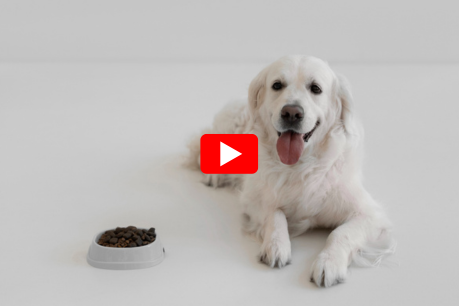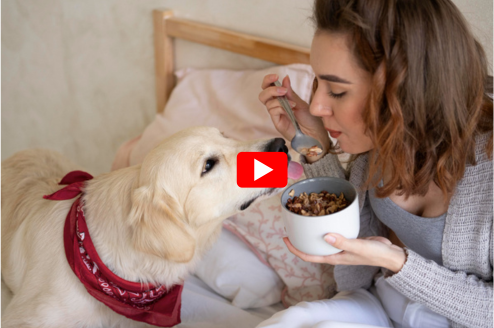Psyllium Husk Powder Dosage for Dogs: Complete Guide
As loving pet parents, we’re constantly searching for ways to enhance our furry friends’ health and well-being. One natural option that has gained popularity is psyllium husk powder, a gentle, plant-based fiber with a long-standing history in human and veterinary wellness.
Whether your dog struggles with constipation, diarrhea, or simply needs better digestive regularity, psyllium husk powder can be a safe and effective tool. But before you reach for that fiber jar, it’s essential to understand the right psyllium husk powder dosage for dogs to avoid unintended issues.
The safe psyllium husk powder dosage for dogs is 1/2 tsp per 10 lbs of body weight daily, mixed with food and plenty of water for best results.
In this comprehensive guide, we’ll cover everything you need to know about using psyllium husk powder for your dog from what it is, its benefits, appropriate dosages by size and condition, to how to safely introduce it into your pet’s routine.
What is Psyllium Husk Powder?
Psyllium husk powder comes from the outer coating of the seeds of the Plantago ovata plant, predominantly grown in India.
It’s a soluble dietary fiber that absorbs water, forming a gel-like substance that aids digestion, promotes stool regularity, and supports overall gut health.
In humans, it’s long used to relieve constipation, regulate bowel movements, and support heart health. Its safety profile and effectiveness have prompted veterinarians to recommend it for dogs with similar digestive concerns.
Why Use Psyllium Husk Powder for Dogs?
Many dog owners turn to psyllium husk powder as a natural way to manage digestive problems without harsh medications. Here’s why it’s a favorite among holistic pet enthusiasts and vets alike:
✔️ Eases Constipation
Psyllium husk powder absorbs water in the intestines, creating bulkier, softer stools. This makes it easier for dogs to pass feces without straining.
✔️ Relieves Diarrhea
Surprisingly, psyllium husk can also help with diarrhea. By soaking up excess water in the colon, it firms up loose stools and slows down bowel movements.
✔️ Manages Anal Gland Problems
Dogs prone to impacted anal glands benefit from bulkier stools, which naturally express these glands during defecation.
✔️ Supports Weight Management
Because it swells with water, psyllium husk can make dogs feel fuller, reducing overeating tendencies.
✔️ Aids Dogs with IBS and Digestive Sensitivities
Dogs dealing with Irritable Bowel Syndrome (IBS) or sensitive stomachs often find symptom relief with added dietary fiber like psyllium husk.
How Much Psyllium Husk Powder Should You Give Your Dog?
This is the big question — and one you shouldn’t take lightly. Like any fiber, too much can cause digestive upset or blockages if your dog isn’t drinking enough water. That’s why it’s crucial to dose it correctly.
🐾 General Dosage Guidelines
A safe general recommendation for psyllium husk powder in dogs is:
-
Small Dogs (Under 10 lbs): ¼ teaspoon once daily
-
Medium Dogs (10–30 lbs): ½ teaspoon once or twice daily
-
Large Dogs (30–60 lbs): 1 teaspoon once or twice daily
-
Extra-Large Dogs (Over 60 lbs): 2 teaspoons once or twice daily
Always mix psyllium husk powder with plenty of water or wet food to prevent it from thickening in your dog’s throat or intestines.
Dosage Based on Purpose
Since psyllium husk can address multiple digestive issues, let’s break down the dosage depending on what you’re using it for.
📌 For Constipation Relief
Start with the lower end of the recommended dosage for your dog’s weight, then gradually increase if necessary. Always mix it well with moist food and monitor stool consistency.
-
Example: A 20-lb dog could start with ½ tsp mixed with ½ cup of water added to food.
📌 For Diarrhea Management
In cases of loose stools or diarrhea, psyllium can absorb excess water and help firm things up. Use the standard recommended dosage based on weight once or twice a day.
-
Example: A 50-lb dog can safely have 1 tsp mixed into wet food or a water slurry twice daily until stools normalize.
📌 For Anal Gland Health
To keep anal glands healthy through consistent, bulky stools, a maintenance dose once daily according to weight is usually sufficient.
-
Example: A 70-lb Labrador may benefit from 2 tsp daily with meals.
📌 For Weight Management
If your dog is overweight, adding psyllium husk before meals can help them feel fuller. Use the standard weight-based dosage, mixed into a broth or wet food, about 15 minutes before feeding.
How to Safely Introduce Psyllium Husk to Your Dog’s Diet
Introducing any new dietary fiber should be a gradual process to avoid causing digestive upsets like gas or bloating. Here’s how to do it safely:
-
Start Low: Begin with a fraction of the recommended dose (about 25-50%) for the first 2-3 days.
-
Mix with Moist Food or Water: Never serve dry psyllium husk to your dog — it expands rapidly upon contact with liquid.
-
Ensure Ample Water Intake: Since psyllium absorbs water, make sure your dog has access to fresh water at all times.
-
Monitor Stools: Watch for changes in stool consistency. Gradually adjust the dose based on results.
-
Stop if Signs of Discomfort Occur: If your dog shows signs of bloating, vomiting, or refusal to eat, discontinue use and consult a vet.
Possible Side Effects to Watch For
While generally safe, psyllium husk powder can cause mild side effects, especially if dosed incorrectly or introduced too quickly.
Common side effects include:
-
Gas and bloating
-
Loose stools (if too much is given initially)
-
Dehydration if not paired with enough water
-
Reduced appetite (from feeling too full)
In rare cases, excessive psyllium husk without enough liquid can cause esophageal or intestinal blockages.
When to Avoid Psyllium Husk for Dogs
While psyllium is suitable for most dogs, it may not be appropriate in certain situations:
-
Dogs with known allergies to Plantago ovata
-
Dogs with esophageal narrowing or swallowing issues
-
Dogs prone to dehydration
-
Before or after abdominal surgeries (unless approved by a vet)
Signs of Too Much Psyllium Husk
If your dog consumes too much psyllium husk powder or isn’t drinking enough water with it, you might notice:
-
Vomiting
-
Loss of appetite
-
Abdominal discomfort
-
Lethargy
-
Straining without passing stool
If any of these occur, stop using it immediately and consult your veterinarian.
How Long Can Dogs Stay on Psyllium Husk?
Psyllium husk powder can be used both as a short-term remedy (for occasional constipation or diarrhea) or as a long-term maintenance aid for dogs prone to chronic issues like anal gland problems or IBS.
For long-term use, it’s recommended to give it daily at a maintenance dose, but always under the guidance of a vet to avoid overuse or dependency.
How to Store Psyllium Husk Powder
Psyllium husk powder should be stored in a cool, dry place, tightly sealed, away from moisture and direct sunlight. Exposure to air and humidity can cause it to clump or lose its potency.
Always check the product’s expiry date before administering it to your dog.
Can You Give Human Psyllium Husk Powder to Dogs?
Yes, most plain, unsweetened human-grade psyllium husk powders are safe for dogs. However, it’s critical to avoid flavored or sweetened varieties, especially those containing xylitol or artificial ingredients, as they are toxic to pets.
Look for plain, organic psyllium husk powder without additives when using it for dogs.
Conclusion
Psyllium husk powder can be a valuable natural remedy for dogs dealing with digestive troubles — but only when dosed properly.
Understanding the appropriate psyllium husk powder dosage for dogs, based on their size and health condition, ensures safe and effective use.
Always start slowly, provide plenty of water, and monitor your pet’s response. When in doubt, consult your veterinarian before adding any fiber supplement to your dog’s routine.
By following these guidelines, you can help your pup stay comfortable, regular, and healthy with this gentle, plant-based fiber source.
References Link
- Psyllium for Dogs: Uses, Dosage, & Side Effects
https://dogtime.com/dog-health/88706-psyllium-dogs-uses-dosage-side-effects
- What To Give a Constipated Dog: 5 Remedies for Dog Constipation
https://www.petmd.com/dog/general-health/what-give-constipated-dog
- Psyllium Fiber Capsules
https://vcahospitals.com/know-your-pet/psyllium-fiber-capsules
- Dog Constipation: Treatment and When To Call Your Vet



